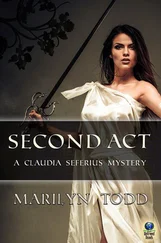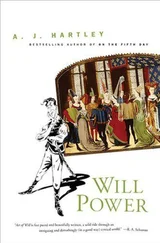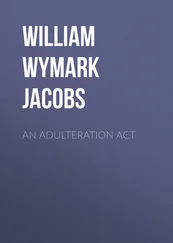Andrew Hartley - Act of Will
Здесь есть возможность читать онлайн «Andrew Hartley - Act of Will» весь текст электронной книги совершенно бесплатно (целиком полную версию без сокращений). В некоторых случаях можно слушать аудио, скачать через торрент в формате fb2 и присутствует краткое содержание. Год выпуска: 2009, ISBN: 2009, Жанр: Фэнтези, на английском языке. Описание произведения, (предисловие) а так же отзывы посетителей доступны на портале библиотеки ЛибКат.
- Название:Act of Will
- Автор:
- Жанр:
- Год:2009
- ISBN:978-0-7653-2124-4
- Рейтинг книги:5 / 5. Голосов: 1
-
Избранное:Добавить в избранное
- Отзывы:
-
Ваша оценка:
- 100
- 1
- 2
- 3
- 4
- 5
Act of Will: краткое содержание, описание и аннотация
Предлагаем к чтению аннотацию, описание, краткое содержание или предисловие (зависит от того, что написал сам автор книги «Act of Will»). Если вы не нашли необходимую информацию о книге — напишите в комментариях, мы постараемся отыскать её.
Act of Will — читать онлайн бесплатно полную книгу (весь текст) целиком
Ниже представлен текст книги, разбитый по страницам. Система сохранения места последней прочитанной страницы, позволяет с удобством читать онлайн бесплатно книгу «Act of Will», без необходимости каждый раз заново искать на чём Вы остановились. Поставьте закладку, и сможете в любой момент перейти на страницу, на которой закончили чтение.
Интервал:
Закладка:
A. J. Hartley
Act of Will
(Will Hawthorne — 1)
To Chris, my brother-in-arms.
ACT
of
WILL
BY
WILLIAM HAWTHORNE
Translated from the Thrusian by
A. J. HARTLEY


TRANSLATOR’S PREFACE
Until a few years ago, the collection of manuscripts now known as the Hawthorne Saga had been sitting in a climate-controlled case in an obscure English library for over a century, baffling all attempts to decipher the strange language in which they were written. We knew from library records that they were once part of the Fossington collection and that they were almost lost when the east wing of Fossington House was badly damaged by fire in 1784. Parts of the second manuscript showed some light scorching, and there was moderately severe water damage to much of the first book, but how they were originally acquired and from where remains a mystery. The eighteenth-century records refer to the crate of Fossington manuscripts only as “handwritten, very old, bound in calf, in indecipherable cursive: language unknown.”
Being completely unreadable, the manuscripts would have remained no more than linguistic and historical curiosities were it not for the recent discovery of certain papers located in the attic of an Elizabethan manor house in Oxfordshire, the precise location of which I am not at liberty to reveal. I was first shown these papers eight years ago. Various experts concurred that the author was none other than the famous translator Sir Thomas Henby (1542–1609). The papers were all in Elizabethan secretary hand and difficult to read, which is the only explanation I can offer for not immediately recognizing that while some of them were in plain English, others were actually transcripts of the strange language featured in the Fossington House papers. Even after I had made the connection, it was another year before I realized that the English pages were actually translations of the so-called indecipherable cursive of the Fossington manuscripts, which actually turned out to be a previously undocumented language: Thrusian. How and with what assistance, if any, Henby accessed the key to this remarkable literary find, I cannot begin to imagine, but there is no question that he did, and left both direct translations of several dozen pages and notes by which the rest might be rendered into English.
I have made up for my slowness to realize the significance of my find by diligent work on the manuscripts ever since. Using Henby’s translations and notes as a kind of Rosetta stone, I have been able to work out the grammar, diction, and tone of the Fossington House papers, which I have renamed the Hawthorne Saga for reasons that will become apparent. In the translation, I have used a modern, colloquial style in an attempt to capture-or at least echo-the uniquely sprightly and energetic Thrusian used by the author. The book in your hands, faithfully translated from the original, is the result. I only hope that you find my labor in bringing this ancient text to light to be worth the reading. If this meets with sufficient approval and I encounter no serious hurdles in the translation, I plan to complete work on the second volume of the series approximately one year from now.
— A. J. Hartley, 2009
No identification of the place-or even the period-from which the original came has yet been made. All attempts to identify known landmarks, places, or geographical features have failed. Militarily, it lacks gunpowder and therefore seems early medieval, but the culture as presented seems later, more in accord with Renaissance Europe.
SCENE I Show Business
It was my eighteenth birthday, which meant that my theatre apprenticeship was officially over: now the company would either take me on as a full member, or they would cut me loose. Either way, this would be my last day in a dress. Thank God.
I’m not sure why the Empire doesn’t allow women onstage. It’s pretty stupid when you stop to think about it. But everyone is used to it and it keeps the likes of me in steady work, so I’m not complaining. Admittedly, most of the parts I got as a woman were comprised of simpering love poetry and vacant smiles, but once in a while I got to do a good death scene, or double as a nameless soldier in a battle, or something. That was pretty fun, and it got me out of those bloody corsets for ten minutes or so.
But none of it equaled the time I got to play a prince. I had three long speeches and a fight scene and, best of all, I got to write some of my own lines. (All actors think they’re poets. Most of them aren’t.) I got a standing ovation at the end of each performance. Not all the boy actors graduate to men’s roles, but I was the best we had at the moment, so I figured there’d still be a job for me when I hung up my skirt for the last time. Probably. Not everyone in the company appreciated my talents, of course, least of all the really stupid ones, who-needless to say-had a lot of sway in the company. If they didn’t take me in as an actor, I’d probably be able to make a living writing for them, but it wouldn’t be much of a living, so I was a bit apprehensive about what they’d tell me after the show.
That was when it would happen. After the stage had been swept and the taproom closed, before they got everyone back out to rehearse the next day’s show, they’d meet and vote and call me into the green room for their verdict. Then I’d be an actor, a writer, or both, or I’d be homeless with no source of income till I could cobble a play together and sell it.
I should say that being an eighteen-year-old in Cresdon means that you’ve been a man for at least half a decade already, even if you’ve made your living in a dress. I can’t compare it to other places, and I’m sure there are kids my age whose comfort and happiness are still carefully engineered by other people, but unless you’re gentry where I live, you pretty much have to claw your way into manhood, and there’s plenty who don’t make it. Kids starve, or they get beaten to death by their so-called benefactors, or they get sold into slavery. I’m not trying to shock you or convince you that I’m some kind of hero for making it this long; but I don’t want you thinking you’re going to get a tale about some blue-eyed tyke with a heart of gold in a world where good triumphs over evil. You’re not, I’m not, and in my experience it never does.
Just so we’re clear.
Anyway. I lived less than half a mile from the theatre, but one of those impromptu markets which Cresdon’s residents seem so fond of had spontaneously appeared right outside the goldsmith’s on Aqueduct Street. I was soon up to my armpits in goats and cheese and bales of smelly wool imported by the equally smelly herders from the Ashran Plains, north of the city. By the time I reached the backstage entrance of the Eagle Theatre, I could already hear the bugles finishing up, which meant they were halfway through what passed for a musical introduction: a florid-faced idiot called Rufus Ramsbottom and an instrument (in the loosest possible sense of the word) which he claimed was an Andastrian bagpipe but which sounded like three cats and a chicken tied together in a sack. Not that anyone took any notice. This was strictly background noise to make the paying public feel that something was starting, thus encouraging them to focus on the crucial business of buying one last pint and fighting each other for seats.
Читать дальшеИнтервал:
Закладка:
Похожие книги на «Act of Will»
Представляем Вашему вниманию похожие книги на «Act of Will» списком для выбора. Мы отобрали схожую по названию и смыслу литературу в надежде предоставить читателям больше вариантов отыскать новые, интересные, ещё непрочитанные произведения.
Обсуждение, отзывы о книге «Act of Will» и просто собственные мнения читателей. Оставьте ваши комментарии, напишите, что Вы думаете о произведении, его смысле или главных героях. Укажите что конкретно понравилось, а что нет, и почему Вы так считаете.












